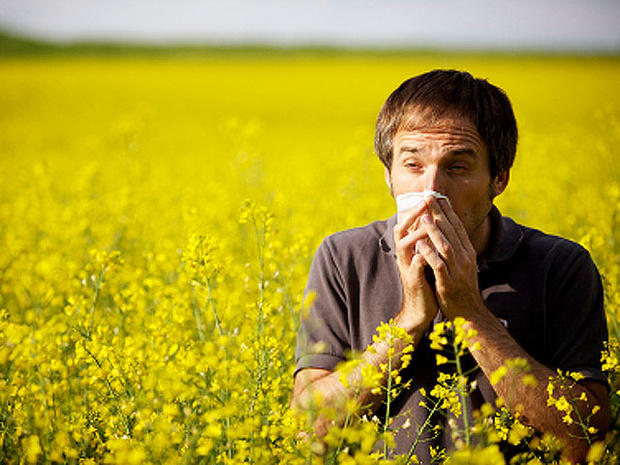Allergy season's early start caused by weak winter, experts warn
(CBS News) Spring clothing is making an early appearance this year. Parts of the country are experiencing warm temperatures, leaving Americans scratching their heads wondering what happened to winter. But experts warn the unseasonably warm winter has brought another early sighting: allergy season.
PICTURES: Allergy relief: 20 simple secrets
PICTURES: Achoo! 12 worst cities for allergy sufferers
Allergists are sounding the alarm that headaches, sniffles and running noses might not be a cold - which is usually common this time of year - but the early onset of what might be a long, dragged out spring allergy season.
"Spring is in the air," according to the American Academy of Allergy Asthma & Immunology. "And so are billions of tiny pollens that trigger allergy symptoms in millions of people."
Symptoms of seasonal allergies, collectively known as hay fever, include itching in the nose, roof of mouth, throat and eyes, sneezing, stuffy or runny nose, tearing eyes and dark circles under the eyes. According to AccuWeather.com, with early March bringing temperatures as high as 70 degrees in some parts of the country, trees such as birch, cedar and pine are pollinating weeks earlier than expected.
"Earlier springs could potentially cause more pollen exposure for many people, prolonging the problem," Mike Tringale, vice president of external affairs at the Asthma and Allergy Foundation of America, told AccuWeather.com.
Dr. Derek Johnson, medical director of the Fairfax Allergy, Asthma and Sinus Clinic in Va. told the Washington Post that high pollen levels started in some areas in the country in February. He said that tree pollen counts on Feb. 23 were 365 grains per cubic meter, compared with a paltry pollen count of 2.88 last year.
"It really is unusually early for patients to be this miserable," Johnson said.
Dr. Linda Dahl, an ear, nose and throat specialist at Lenox Hill Hospital in New York City, told HealthPop that what's exacerbating the problem is that fall allergy season may never have left. Dahl said there's been a carryover of ragweed from the fall into pollen in the spring, and she's seen it first-hand in her practice where patients have been suffering all year.
"We didn't really have a nice deep freeze this winter, so a lot of what would have been killed in the fall didn't die," Dahl told HealthPop.
What's more, since the weather has been warmer, people are more likely to crack their window or go outside. She says that might introduce pollen allergens into a home that may already be filled with indoor allergens such as dust, mold and pet dander, making matters worse.
What can be done to deal with this year's never-ending allergy season?
"The key to treating allergies is prevention more than anything," Dahl says. She said people who know they're going to get spring allergies should pre-treat with antihistamine to avoid symptoms. "If you wait until you're symptomatic, you're playing catch-up."
The American Academy of Allergy Asthma and Immunology recommends people limit their outdoor time during days with high pollen counts (which can be checked here), take a shower immediately after coming indoors and keep their windows closed at home or in the car.
If you're already experiencing hay fever symptoms, Dahl recommends natural treatments like sinus irrigation or a neti pot. More severe allergies could be treated with an over-the-counter antihistamine. If that doesn't work, she said, see a doctor who could provide a stronger antihistamine or oral steroids if necessary.
The National Institutes of Health has more on hay fever.
